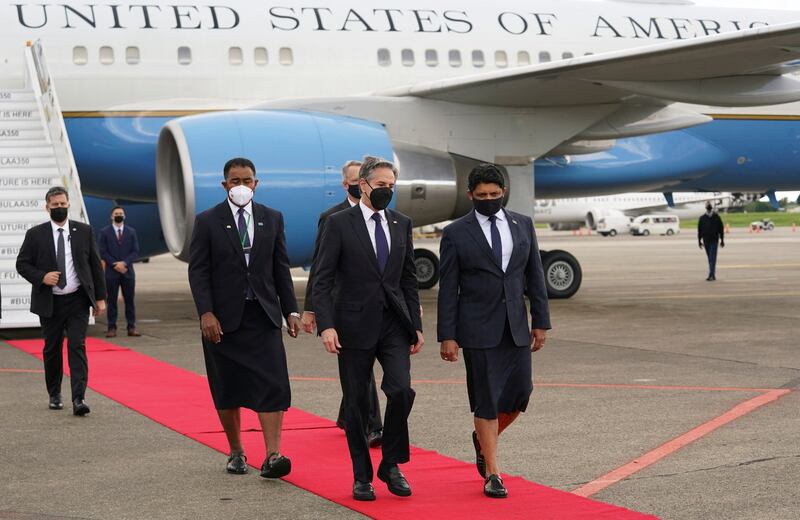Updated at 12:25 a.m. EST on 2022-09-29
Leaders of Pacific island nations have agreed to the text of a joint declaration of partnership with the United States, U.S. Secretary of State Antony Blinken said at the opening of a two-day summit in Washington on Wednesday.
The announcement came after reports that the Solomon Islands planned not to sign an 11-point declaration during the summit, the first such meeting with leaders from the region hosted by the White House. In April, the Solomon Islands signed a secret security pact with China, raising concerns among the U.S. and Pacific allies that Beijing could be moving to establish a military presence in the South Pacific.
Blinken said the United States was committed to working closely with the leaders of 12 Pacific island nations in attendance on issues including climate change, fisheries and maritime security in the Indo-Pacific region.
“I’m especially pleased, as we start our conversations, as we start these two days, with President [Joe] Biden joining us tomorrow, that we’ve also come together around a declaration of partnership between the U.S. and the Pacific,” Blinken said.
The declaration “shows that we have a shared vision,” he said in remarks broadcast on YouTube. “It will give us a roadmap for the work we’re doing in the future.”
Blinken did not say what was in the final version of the declaration. The State Department did not immediately respond to requests for a copy of the text.
The summit comes amid a renewed U.S. focus on the Pacific and concerns in Washington about China's growing influence in the region that were amplified after Beijing inked its new security pact with the Solomons five months ago.

Brian Harding, a senior Asia expert for the United States Institute of Peace, said the summit was significant primarily because it is the first time that Pacific islands leaders have been invited for talks at a dedicated forum in the United States.
“Previous meetings have taken place on the sidelines of other meetings in Hawaii or of the United Nations General Assembly,” Harding told Radio Free Asia (RFA), an online news service affiliated with BenarNews.
“It’s unfortunate that so much attention has been focused on this particular declaration, because what Pacific islanders want from this is a wide-ranging and open conversation.”
Harding said the focus on the declaration could be due to Beijing’s failure to secure a similar regional joint declaration during Foreign Minister Wang Yi’s tour of the Pacific in April, which produced the secret deal with the Solomons.
But after decades of a reduced focus on the Pacific region, “there’s concerns that the United States is trying to move a little too fast,” Harding said.
Mihai Sora, a Pacific analyst at Australia’s Lowy Institute, said the summit doesn’t need to have announcements of major new U.S. commitments to have value.
“I think the summit is more about building credibility and establishing relationships with Pacific leaders which is absolutely a vital part of U.S. reengagement,” he told BenarNews. “It would be valuable for Pacific leaders to feel they have that direct access and that direct relationship with someone like Biden.”
Superpower competition in the Pacific
The agreement on a joint declaration marks a potential U.S. win in a vast maritime region where Washington and Beijing are vying for influence and after small island states rejected China’s push for a wide-ranging pact.
During a telephone press briefing on the eve of the summit, a senior Biden administration official, who spoke to reporters on the condition of anonymity, said the joint agreement “really is about a larger vision in which the United States and Pacific island nations sign up to some joint endeavors which are important.”
Biden’s Pacific summit is meant to show a deeper U.S. commitment to a vast and economically lagging region that has increasingly turned to China to meet its development needs, officials and analysts said.
Over two decades, China has become an important source of infrastructure, loans and aid for Pacific island nations as it seeks to isolate Taiwan diplomatically and gain regional allies in international organizations such as the United Nations.
Some analysts say Beijing also wants a military presence in the Pacific as a challenge to U.S. dominance. The pact it signed with the Solomon Islands would allow Beijing to send security forces to protect Chinese interests in those islands. But 10 Pacific countries rebuffed the Chinese government’s attempt to get them to sign up to its vision for the region.
The Solomon Islands government had objected to signing the United States’ proposed declaration, Australian state broadcaster ABC reported on Wednesday, without citing a source.
U.S. officials are also expected to release a national strategy on the Pacific during the summit, as well as other financial commitments. Biden is scheduled to meet with Pacific islands leaders for dinner to close the summit on Thursday night.
RFA and BenarNews jointly produced this report. It has been updated to include some details from the first day of the summit.
